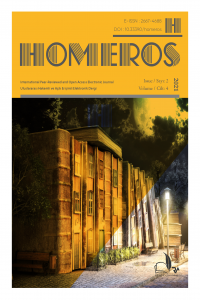Öz
Kaynakça
- БЫКОВА Г. В. (2002). Лакуны в языковом образе мира //Ученые записки БГПУ. Т. 20. Благовещенск, с.41- 48
- ЖЕЛЬВИС В.И. (1997). К вопросу о характере русских и английских лакун //Нацио¬наль¬но -культурная специфика речевого поведения. М.: Наука, с. 136-146
- МАХОНИНА А.А. (2004). К проблеме типологии межъязыковых лакун //Сопоста-вительные исследования. Воронеж, с.27-33
- MAKHONINA A. (2004). English-Russian Thematic Dictionary of Non-Equivalent Lexis //English Language Teaching in Russia: Building a Professional Community. 10th NATE Russia Conference Proceedings. Tambov, May 31- June 4, р. 29-30
- МЮЛЛЕР В.К. (2018). Большой англо-русский и русско-английский словарь. М.: Славянский Дом Книги, 960 с.
- ROHN U. (2011). Lacuna or Universal? Introducing a new model for understanding cross-cultural audience demand. https://journals.sagepub. com/doi/abs/10. 1177/0163443711399223? journalCode=mcsa
- Русско-азербайджанский словарь в 4-х томах. Баку: Qərb-Şərq, 2006
- СТЕРНИН И.А., ПОПОВА З.Д., СТЕРНИНА М.А. (2004). Лакуны и концепты в аспекте национальной специфики языка и мышления //Русский язык как иностранный: Теория. Исследования. Практика. Вып. VII. СПб, с. 8 -23
- СТЕРНИН И.А., БЫКОВА Г.В. Концепты и лакуны https://iling-ran. ru/library /psylingva /sborniki/Book1998/articles/2_2.htm
- XƏLILOV B. (2008). Müasir Azərbaycan dilinin leksikologiyası. Bakı, 441s.
Öz
The article deals with such an interesting and rather complex, multidimensional phenomenon as lacuna on the material of three unrelated languages-Russian, Azerbaijani and English. The lexical lacunae are systematized and analyzed on the following groups: motivated and non-motivated lacunae. Motivated lacuna is connected with the following fact: the native speakers of the other languages do not have this reality idea. Such lacuna can be revealed in the field of the unequal lexeme. However, non-motivated lacuna is not explained by the absence of the idea. The idea exists, but the native speakers of the other languages did not call it owing to the certain cultural, mental, geographical, social, psychological or other reasons. Perhaps, they did not attach importance to them. So, non-motivated lacunae are considered on the concrete lexical-semantic groups in the article :1. Family relationship terms which are divided into two groups: a) blood relations; b) marital relationship. It should be noted that there are no special terms of marital relationship in English unlike Russian and Azerbaijani. The terms of blood relations are used together with the word “law” in postposition in order to denote the necessary marital relationship in English. 2. Nature: natural phenomena, flora and fauna. This group includes a lot of various lacunae connected with nature, natural phenomena. Such lacunae are caused by such objective factors as features of landscape, climatic conditions, relief, predominance of concrete animal, bird, insect, fish species etc. Certainly, the main factor is concrete people’s perception of nature, natural phenomena. Perception of the world influences nomination, highlighting specific natural objects taking into account the degree of their importance. When studying lacunae it is important to take into consideration both extra- and intralinguistic factors.
Anahtar Kelimeler
lexical lacunae motivated lacunae non-motivated lacunae family relationship natural phenomena mentality
Kaynakça
- БЫКОВА Г. В. (2002). Лакуны в языковом образе мира //Ученые записки БГПУ. Т. 20. Благовещенск, с.41- 48
- ЖЕЛЬВИС В.И. (1997). К вопросу о характере русских и английских лакун //Нацио¬наль¬но -культурная специфика речевого поведения. М.: Наука, с. 136-146
- МАХОНИНА А.А. (2004). К проблеме типологии межъязыковых лакун //Сопоста-вительные исследования. Воронеж, с.27-33
- MAKHONINA A. (2004). English-Russian Thematic Dictionary of Non-Equivalent Lexis //English Language Teaching in Russia: Building a Professional Community. 10th NATE Russia Conference Proceedings. Tambov, May 31- June 4, р. 29-30
- МЮЛЛЕР В.К. (2018). Большой англо-русский и русско-английский словарь. М.: Славянский Дом Книги, 960 с.
- ROHN U. (2011). Lacuna or Universal? Introducing a new model for understanding cross-cultural audience demand. https://journals.sagepub. com/doi/abs/10. 1177/0163443711399223? journalCode=mcsa
- Русско-азербайджанский словарь в 4-х томах. Баку: Qərb-Şərq, 2006
- СТЕРНИН И.А., ПОПОВА З.Д., СТЕРНИНА М.А. (2004). Лакуны и концепты в аспекте национальной специфики языка и мышления //Русский язык как иностранный: Теория. Исследования. Практика. Вып. VII. СПб, с. 8 -23
- СТЕРНИН И.А., БЫКОВА Г.В. Концепты и лакуны https://iling-ran. ru/library /psylingva /sborniki/Book1998/articles/2_2.htm
- XƏLILOV B. (2008). Müasir Azərbaycan dilinin leksikologiyası. Bakı, 441s.
Ayrıntılar
| Birincil Dil | İngilizce |
|---|---|
| Konular | Dil Çalışmaları |
| Bölüm | Araştırma Makaleleri |
| Yazarlar | |
| Yayımlanma Tarihi | 30 Nisan 2021 |
| Gönderilme Tarihi | 16 Mart 2024 |
| Yayımlandığı Sayı | Yıl 2021 Cilt: 4 Sayı: 2 |


